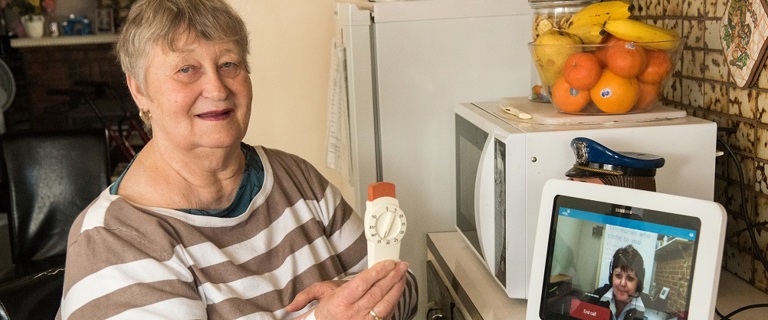Diabetes care trial supports optimum wellbeing at home

A first-of-its-kind research collaboration between Bolton Clarke and Austin Health is evaluating a new model of diabetes care to optimise diabetes management in the home and improve quality of life for older people.
OPTIMISES involves 43 older people (over 65) with diabetes in Northern metropolitan Melbourne.
Data is currently being analysed after a four-month trial in which an expert diabetes team supported each client through a multi-faceted approach including home visits with a Bolton Clarke diabetes nurse educator, flash glucose monitoring technology that takes frequent blood glucose measurements 24 hours a day over a two-week period and telehealth consultations with an Austin Health endocrinologist.
The diabetes educator, the Austin Health endocrinologist and the participant with diabetes collaboratively developed a diabetes management plan for the participant.
The diabetes educator provided regular at-home support throughout the study period with additional input from the endocrinologist, Bolton Clarke generalist nurses and other services, as required.
The impact of the model is being measured using clinical and biomedical markers as well as measures important to older people including quality of life, wellbeing and treatment satisfaction.
Bolton Clarke Research Institute (BCRI) Senior Research Fellow Dr Rajna Ogrin said initial data assessing the impact of the individualised management approach was promising.
“When I started I felt a little bit sick. In the end I feel 100 times better,” one participant said.
“It’s been an eye opener and it has calmed some of my fears about diabetes,” said another. “I mean I was never comfortable with it, but I’m more comfortable now.”
Dr Ogrin said type 2 diabetes was a chronic disease that was increasingly prevalent with age, 15 per cent of people aged 65-74 affected compared with 4.7 per cent of the general population.
“Managing diabetes is complex and particularly challenging in older people, as they generally have other health conditions and medications,” she said.
Guidelines for best practice management in older people recommend attention be paid to weighing the benefits of treatment to prevent complications including kidney damage, blindness and cognitive decline against the risks, which include hypoglycaemia and its consequences such as falls, confusion, vision impairment and medicine-related adverse events.
Finding the balance means developing individual treatment targets that take each person’s health and functional capacity into account.
“While we have information regarding the medicines use of Australians with type 2 diabetes, we don’t have any information about the current diabetes management patterns in older people, and whether management aligns with best practice,” Dr Ogrin said.
“It is possible we have many older people being over-treated or under-treated.
“Individualised care is promoted as the best way to achieve optimal management for people living with type 2 diabetes, however we don’t have any information about how to do this, and whether it is feasible or safe.”
Findings from the OPTIMISES trial will be published later this year.

